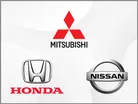Nissan, Honda, and Mitsubishi Unite for EV Innovation

Nissan Motor Co., Ltd., Honda Motor Co., Ltd., and Mitsubishi Motors Corporation have partnered strategically to enhance automobile intelligence and electrification.
The trio has signed a Memorandum of Understanding (MOU) to establish a framework for collaboration, building on the previous agreement signed by Nissan and Honda.
The partnership aims to leverage the unique strengths of each company to deliver innovative products and services that address the diverse needs of global consumers.
Accelerating carbon neutrality and safety
Nissan and Honda are committed to advancing initiatives focused on carbon neutrality and achieving a zero-traffic-accident society.
The companies anticipate collaborating in environmental technologies, electrification technologies, and software development.
As Toshihiro Mibe, President and Representative Executive Officer of Honda, explains: "The automobile industry is in a period of transformation said to occur once in a century."
"We expect that the combination of technologies and knowledge cultivated by Nissan and Honda, as well as the strength and experience of Mitsubishi Motors, will enable us to resolve various issues related to electrification and intelligence on a global scale and help lead societal reforms as a top runner."
By combining their technologies and knowledge, the three companies aim to drive significant advancements in automotive electrification and intelligence globally.
Value through synergy
Mitsubishi Motors' integration into this collaborative framework is expected to bring new strengths and synergies that can only be generated by the three companies working together.
The collaboration will introduce new knowledge and expertise and open up new business opportunities.
Takao Kato, Representative Executive Officer, President and CEO, Mitsubishi Motors states: "Nissan and Honda's discussions on a possible partnership have progressed, and we have decided to participate in this framework.
Collaboration with partners is essential in today's automotive industry, which is undergoing rapid changes due to technological innovations such as electrification and intelligence. We believe we can discover new possibilities in various fields through collaboration among the three companies."
To accelerate the process, the companies will focus on creating new value by integrating their technologies and knowledge, improving business efficiencies.
By working together, they aim to address various challenges related to electrification and intelligence, positioning themselves as leaders in the global automotive industry.
The impact of MOUs
MOUs are crucial for driving innovation.
They establish a collaborative framework between different organisations, encouraging sharing of resources, expertise, and ideas.
These agreements provide a formal yet flexible platform for parties to align their goals and strategies without the binding commitments of a legal contract.
Flexibility is essential in innovation, where rapid changes and unforeseen challenges are expected.
MOUs enable organisations to pool their strengths, facilitating cross-industry partnerships that can lead to groundbreaking solutions.
For instance, a tech company might collaborate with a healthcare provider to develop innovative medical devices, leveraging their combined expertise to create something neither could achieve alone.
Such collaborations often lead to developing new technologies, products, and services that can reshape industries.
Moreover, MOUs help manage risk by allowing parties to explore potential partnerships and innovations without significant financial or legal obligations.
This encourages experimentation and creativity, as parties can test new ideas and concepts with reduced risk.
Finally, MOUs can accelerate time-to-market for innovations by streamlining communication and decision-making processes.
With clear objectives and roles outlined, organisations can focus on achieving their shared vision more efficiently, ultimately driving progress and innovation in their respective fields.
**************
Make sure you check out the latest edition of EV Magazine and also sign up to our global conference series - Sustainability LIVE 2024
**************
EV Magazine is a BizClik brand.


